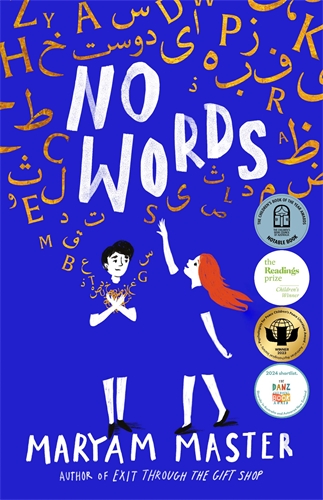Right from the opening scene that blasts us into what feels like a performance space rather than a novel, the title 'No Words' is ironic. There are plenty of words - too many of them. At times it's like one of those TV talk show galleries, where all the mouths are moving at once, but too few ears are listening. The narrator has been burdened with the name Hero - and like her, we wonder why any parent would do that to a young girl, but we get the answer when her father stands on a chair in the restaurant, delivers the operatic cliche 'Figaro, Figaro, Figarohhhhh!' at the top of his voice. This is one of Dad's UP days, and the answer is he doesn't know how to read the room. Ironic, for an English professor. (He has DOWN days too, but the novel never names his condition.)
At his polar opposite is Aria, an Iranian refugee in Hero's class. Hero's surname Rodriguez, by the way, adds another unexplored layer to the novel's multicultural theme. Like John Marsden's Marina, or Morris Gleitzman's Rowena, Aria is a selective mute. But the reader is admitted into a conspiratorial silence as Aria tells us his story in chapters that alternate with Hero's. Hero is drawn to his silence as an oasis from all the yapping around them. At first we are the only ones who know Aria can talk at home, and to his therapist, but he won't talk at school. He's living with a different unnamed condition: social anxiety disorder.
As Aria gradually tells the painful story of his escape from Iran, his mother's death right at the point of freedom, and the bullying he has to endure from one of the older boys, Doofus Rufus, his sections of the narrative become longer and longer. He is revealed as a prize-winning poet, and the novel closes with the beautiful and moving poem that tells the story of his journey to live in Australia. The absolute opposite of the novel's bogus operatic opening, this heartfelt song is an unvoiced testament to his name: Aria.
Young readers will be challenged by the question of displacement and Othering; by this construction of the contemporary world in which everyone talks (shouts) and no one listens; by the cruelty of gossip and bullying - which is still bullying when it's turned back on the bully; by the question of whether language constitutes reality (a girl named Hero, a boy named Aria - does a word determine fate?); and by the novel's exploration of empathy and mental health.
WINNER OF THE ABDA BOOK DESIGN AWARDS 2023 BEST DESIGNED CHILDREN'S FICTION COVER
WINNER OF THE READINGS CHILDREN'S PRIZE 2023
WINNER OF THE CHILDREN'S PEACE LITERATURE AWARD 2023
CBCA BOOK OF THE YEAR NOTABLE 2023 BOOK OF THE YEAR: YOUNGER READERS
SHORTLISTED FOR THE YABBA AWARDS 2024
SHORTLISTED FOR THE 2024 DANZ CHILDREN'S BOOK AWARD

